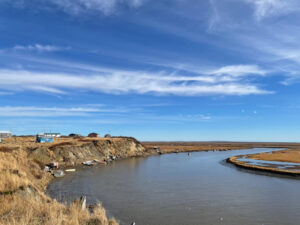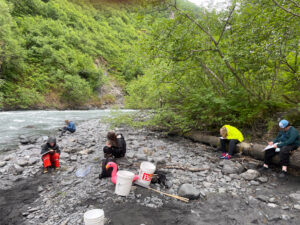SUMMARY
This unit is designed for 2nd grade, but could be adapted to other grades. Students construct an understanding of habitat and the organisms that live within specific habitats, and gain respect for living creatures and care of the world around them through five different investigations, each building on the next. Science Notebooks are used throughout the unit to help students understand and organize information. Native Ways of Knowing are supported as students learn respect for living creatures and care of the world around them.
Essential Question
- Who Lives Where and Why?
Enduring Understandings
- Living things have certain characteristics that help them survive.
- Living things need food, water, oxygen and shelter to survive.
- Science is a way to help us answer questions about the world around us.
Ocean Literacy Principle Addressed
- The ocean supports a great diversity of life and ecosystems.
LESSON PLANS

Aquatic Habitats
Students identify specific traits of a habitat. They start with a familiar local habitat and then focus on aquatic habitats.
View Lesson Plan
Field Session
Using skills and background information they have developed through classroom experiences and the initial nature walk, students will go into the field to observe and measure local habitats. Students will begin by exploring the area, then do “timed counts” to get an idea of the observable organisms in the local environment. They will then focus individually on one small area to study.
View Lesson PlanHabitats
In this activity, students begin their discovery of aquatic environments, and start to notice that water is all around them, in their neighborhoods, backyards, oceans, rivers, ponds, and creeks. They take a first look at “Our Big Blue Planet” with a globe game.
View Lesson Plan
Location:
Activity Type:

We Search
Students select an animal to research from a list of teacher-chosen freshwater animals, tide pool creatures, or ocean mammals. They learn that an animal lives within a specific habitat because it is able to meet its needs for food, water, and shelter. Students will develop the understanding that they can find information about specific animals and habitats in books, on the Internet, and from their own local environment and that they can learn from scientists and other experts.
View Lesson PlanAUTHORS
Jennifer Thompson, Teacher, Juneau School District
Denise Caposey, Teacher, Skagway School District
Linda Ramsey, Teacher, Mat-Su School District
Marilyn Sigman, Scientist, Center for Alaskan Coastal Studies, Homer, Alaska
Stephanie Hoag, Curriculum Consultant, Juneau, Alaska
